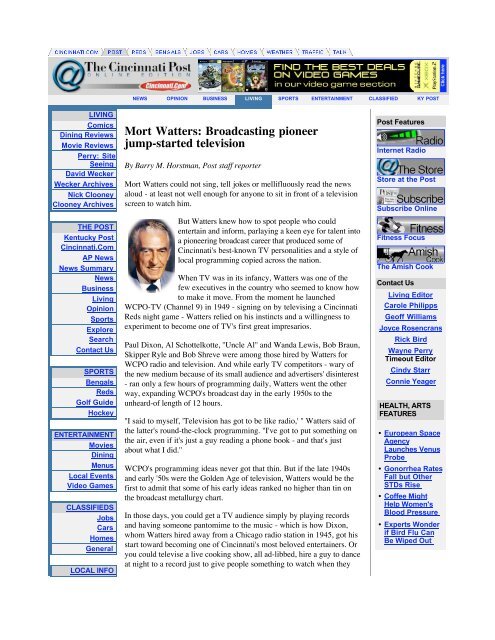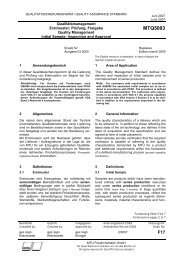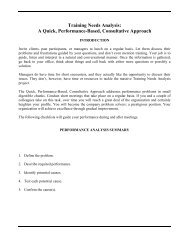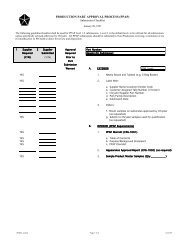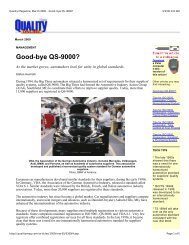Mort Watters: Broadcasting pioneer jump-started television
Mort Watters: Broadcasting pioneer jump-started television
Mort Watters: Broadcasting pioneer jump-started television
You also want an ePaper? Increase the reach of your titles
YUMPU automatically turns print PDFs into web optimized ePapers that Google loves.
LIVING<br />
Comics<br />
Dining Reviews<br />
Movie Reviews<br />
Perry: Site<br />
Seeing<br />
David Wecker<br />
Wecker Archives<br />
Nick Clooney<br />
Clooney Archives<br />
THE POST<br />
Kentucky Post<br />
Cincinnati.Com<br />
AP News<br />
News Summary<br />
News<br />
Business<br />
Living<br />
Opinion<br />
Sports<br />
Explore<br />
Search<br />
Contact Us<br />
SPORTS<br />
Bengals<br />
Reds<br />
Golf Guide<br />
Hockey<br />
ENTERTAINMENT<br />
Movies<br />
Dining<br />
Menus<br />
Local Events<br />
Video Games<br />
CLASSIFIEDS<br />
Jobs<br />
Cars<br />
Homes<br />
General<br />
LOCAL INFO<br />
NEWS OPINION BUSINESS LIVING SPORTS ENTERTAINMENT CLASSIFIED KY POST<br />
<strong>Mort</strong> <strong>Watters</strong>: <strong>Broadcasting</strong> <strong>pioneer</strong><br />
<strong>jump</strong>-<strong>started</strong> <strong>television</strong><br />
By Barry M. Horstman, Post staff reporter<br />
<strong>Mort</strong> <strong>Watters</strong> could not sing, tell jokes or mellifluously read the news<br />
aloud - at least not well enough for anyone to sit in front of a <strong>television</strong><br />
screen to watch him.<br />
But <strong>Watters</strong> knew how to spot people who could<br />
entertain and inform, parlaying a keen eye for talent into<br />
a <strong>pioneer</strong>ing broadcast career that produced some of<br />
Cincinnati's best-known TV personalities and a style of<br />
local programming copied across the nation.<br />
When TV was in its infancy, <strong>Watters</strong> was one of the<br />
few executives in the country who seemed to know how<br />
to make it move. From the moment he launched<br />
WCPO-TV (Channel 9) in 1949 - signing on by televising a Cincinnati<br />
Reds night game - <strong>Watters</strong> relied on his instincts and a willingness to<br />
experiment to become one of TV's first great impresarios.<br />
Paul Dixon, Al Schottelkotte, ''Uncle Al'' and Wanda Lewis, Bob Braun,<br />
Skipper Ryle and Bob Shreve were among those hired by <strong>Watters</strong> for<br />
WCPO radio and <strong>television</strong>. And while early TV competitors - wary of<br />
the new medium because of its small audience and advertisers' disinterest<br />
- ran only a few hours of programming daily, <strong>Watters</strong> went the other<br />
way, expanding WCPO's broadcast day in the early 1950s to the<br />
unheard-of length of 12 hours.<br />
''I said to myself, 'Television has got to be like radio,' '' <strong>Watters</strong> said of<br />
the latter's round-the-clock programming. ''I've got to put something on<br />
the air, even if it's just a guy reading a phone book - and that's just<br />
about what I did.''<br />
WCPO's programming ideas never got that thin. But if the late 1940s<br />
and early '50s were the Golden Age of <strong>television</strong>, <strong>Watters</strong> would be the<br />
first to admit that some of his early ideas ranked no higher than tin on<br />
the broadcast metallurgy chart.<br />
In those days, you could get a TV audience simply by playing records<br />
and having someone pantomime to the music - which is how Dixon,<br />
whom <strong>Watters</strong> hired away from a Chicago radio station in 1945, got his<br />
start toward becoming one of Cincinnati's most beloved entertainers. Or<br />
you could televise a live cooking show, all ad-libbed, hire a guy to dance<br />
at night to a record just to give people something to watch when they<br />
Post Features<br />
Internet Radio<br />
Store at the Post<br />
Subscribe Online<br />
Fitness Focus<br />
The Amish Cook<br />
Contact Us<br />
Living Editor<br />
Carole Philipps<br />
Geoff Williams<br />
Joyce Rosencrans<br />
Rick Bird<br />
Wayne Perry<br />
Timeout Editor<br />
Cindy Starr<br />
Connie Yeager<br />
HEALTH, ARTS<br />
FEATURES<br />
• European Space<br />
Agency<br />
Launches Venus<br />
Probe<br />
• Gonorrhea Rates<br />
Fall but Other<br />
STDs Rise<br />
• Coffee Might<br />
Help Women's<br />
Blood Pressure<br />
• Experts Wonder<br />
if Bird Flu Can<br />
Be Wiped Out
Maps / Directions<br />
Send an<br />
E-Postcard<br />
Visitor's Guide<br />
Local Links<br />
School Links<br />
came home late, or put the zany Shreve on overnight with a bunch of<br />
B-movies, a rubber chicken and equally rubbery wisecracks.<br />
<strong>Watters</strong> did all those things and more during WCPO-TV's early years -<br />
hitting on enough successes to enhance Cincinnati's national reputation<br />
as a broadcasting center then rivaling New York City. A number of<br />
WCPO shows produced under <strong>Watters</strong> even ''went network,'' and a<br />
contract that he signed with 20th Century Fox in the mid-1950s was the<br />
first authorizing major studio films to be shown on <strong>television</strong>.<br />
''He was a very creative, imaginative, impulsive, off-the-wall kind of<br />
guy,'' said Lawrence A. Leser, chairman of the board for the E.W.<br />
Scripps Co., which owns WCPO and The Post.<br />
Born in 1909 in Rochester, N.Y., <strong>Watters</strong> graduated from Georgetown<br />
University in 1932 with a bachelor of philosophy degree. While in<br />
college, he was an unpaid office boy at NBC's Washington radio station,<br />
WRC - and learned enough about the business to get a salaried job after<br />
graduation as the radio director of a small advertising agency in<br />
Washington.<br />
After a year, he returned to Rochester to become sales manager of a radio<br />
station, and then, at 25, became head of a chain of three radio stations in<br />
West Virginia - making him the youngest general manager of a<br />
broadcasting organization in the nation.<br />
In 1938, Scripps Howard <strong>Broadcasting</strong> hired <strong>Watters</strong> to run a radio<br />
station that it bought here, changing its call letters to WCPO to reflect<br />
its close ties with The Post. <strong>Watters</strong> moved his radio news staff into the<br />
newspaper's city room, where all WCPO newscasts originated as it<br />
became the first local station to broadcast news hourly, with headlines<br />
on the half hour.<br />
When WCPO-TV <strong>started</strong> in 1949, <strong>Watters</strong> - by then a vice president of<br />
Scripps Howard <strong>Broadcasting</strong> - eagerly took on the new task, convinced<br />
that the success of local TV stations hinged on the quality of local<br />
programming and news shows. ''People here can relate more to Mary<br />
Jones of Price Hill than Mary Jones of Chicago,'' he said.<br />
At its outset, Channel 9 was affiliated with the old Dumont network, the<br />
weakest of the three networks then in existence - giving <strong>Watters</strong> the<br />
green light to take chances on new talent and ideas in WCPO's crowded<br />
studios on Symmes Street in Walnut Hills. He offered on-air talent<br />
advice as simple as it was blunt: ''Do what you want to do, and if you<br />
get an audience, you'll stay on. If you flop, you're out.''<br />
A decade later, <strong>Watters</strong> again had little to lose when he hired<br />
Schottelkotte, then an Enquirer columnist and news reader on<br />
WSAI-FM, to reverse Channel 9's embarrassingly low local TV news<br />
ratings - a measly 1, compared to a 15 for Channel 5 and a 13 for<br />
Channel 12.<br />
Within hours of being hired, Schottelkotte was on the air, sent into the<br />
studio with this pep talk from <strong>Watters</strong>: ''Don't worry about the audience<br />
- you won't have one.'' Schottelkotte soon enough had an audience,<br />
• GOP Lawmakers<br />
Voice Qualms<br />
About Flu Plan<br />
• Paris Hilton<br />
Subpoenaed in<br />
L.A. Case<br />
• 'Housewives'<br />
Actor Page<br />
Kennedy Fired<br />
• Moss Leaves<br />
Rehab, Returns<br />
to Modeling<br />
• CBS, NBC Offer<br />
On-Demand<br />
Replays of<br />
Shows<br />
• CBS Orders<br />
More Editions of<br />
'Survivor'<br />
• The Weather<br />
Channel Brings<br />
in Lewis Black<br />
• Kirstie Alley No<br />
Longer a 'Fat<br />
Actress'<br />
• CBS Stretches<br />
Winning Streak<br />
During Sweeps<br />
• Penn & Teller<br />
Return With TV<br />
Special<br />
• Kate Hudson<br />
Goes to Court<br />
Over Photos
however, rising to No. 1 in the ratings within two years - a position he<br />
retained for an astonishing 22 consecutive years.<br />
As in hiring Schottelkotte, <strong>Watters</strong> - named ''TV's Man of the Year'' by<br />
the broadcast trade publication Variety in 1950 - was a master at<br />
combining talent, concept and opportunity to maximum advantage.<br />
Undeterred that another station already was televising Reds games,<br />
<strong>Watters</strong> simply put Channel 9's cameras in better spots to catch the<br />
action and quickly gained the most viewers. When a weather segment<br />
was added to newscasts, <strong>Watters</strong> decided to ''glamorize'' it by hiring one<br />
of the nation's first beautiful ''weather-girls.'' (That proved to be an<br />
offscreen success as well, as <strong>Watters</strong> married her.) And when Channel 5<br />
initially chose not to carry ''The Tonight Show'' - which, as an NBC<br />
outlet, it was entitled to - <strong>Watters</strong> quickly snapped up the popular<br />
late-night program, giving Channel 9 a ratings windfall.<br />
<strong>Watters</strong> retired as executive vice president of Scripps Howard<br />
<strong>Broadcasting</strong> in 1981 and finally could devote more time to his other<br />
passion - boating on the Ohio River, in a succession of gradually larger<br />
vessels named ''Muddy <strong>Watters</strong>.'' He died in 1997 at his Indian Hill<br />
home, days short of his 88th birthday.<br />
<strong>Watters</strong> often said he had no particular talent in programming, describing<br />
his philosophy as simply ''hiring people willing to take a chance (and)<br />
who seemed to know what they were talking about.''<br />
That not only was the formula that built WCPO into a powerhouse, it<br />
also described the man who made it one: <strong>Mort</strong> <strong>Watters</strong>.<br />
Publication date: 06-07-99<br />
NEWS OPINION BUSINESS LIVING SPORTS ENTERTAINMENT CLASSIFIED KY POST<br />
Need help? | Suggestions | News tips | Letters to editors<br />
Web advertising | Place a classified | Subscribe | Circulation<br />
Copyright 2005 The Cincinnati Post, an E.W. Scripps newspaper.<br />
Use of this site signifies agreement to terms of service updated 12/19/02.


